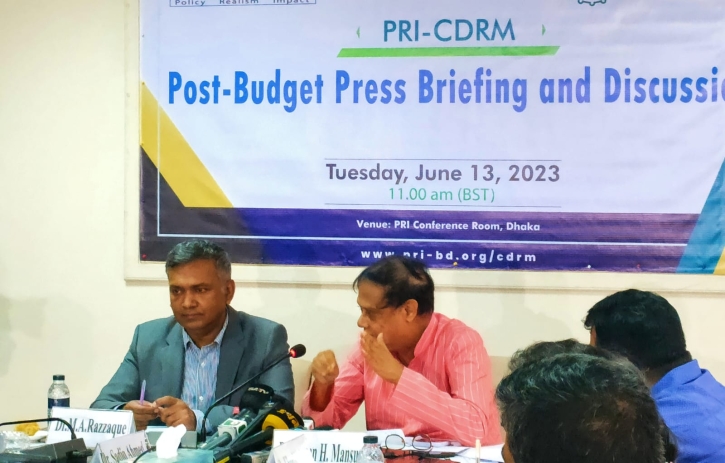PRI suggests cut in public expenditures, market-based interest rate for macroeconomic stability
UNB || BusinessInsider

Photo: Collected
The government should go for a cut in public expenditures along with market-based interest and foreign exchange rates for keeping macroeconomic stability, Executive Director of Policy Research Institute Ahsan H Mansur said on Tuesday.
He suggested reduction of spending in Annual Development Programme and administrative expenses overcome the challenges faced by the country’s economy.
Mansur, a noted economist, said this while speaking at a post-budget press conference jointly organized by PRI and the Centre for Domestic Resource Mobilization (CDRM), held at PRI Auditorium on Tuesday.
He said rapid increase in domestic interest payments is a matter of concern and it is projected to surpass Tk1.0 lakh crore in FY 24 which is 33 percent of NBR revenue of FY23.
The proposed budget set a revenue collection target of Tk 5 lakh crore, leaving a deficit of Tk 2.61 lakh crore. The NBR cannot collect 75 percent of targeted revenue, and so the budget deficit will be widened in the coming fiscal, he said.
In spite of that, the National Board Revenue's collection target for FY24 is set at Tk4. 30 lakh crores, which was Tk3. 70 lakh crore in the outgoing fiscal year, deficit revenue earning and increasing public expenditure would break down discipline in the financial sector, he opined.
PRI’s Research director MA Razzaque gave a presentation on ‘Key Macroeconomic Development and Concerned’ highlighting the slow pace of domestic revenue collection, budget deficit management, prudent policy for curbing inflation, and stable exchange rate.
“The proposed budget has concentrated on GDP growth where the government would require more money to spend for ADP and other public sector, which will cause increasing government borrowing as the revenue collection target is unrealistic,” he pointed out.
In the outgoing fiscal year 2022-23, actual GDP growth is likely 6 percent compared to the fiscal original target of 7.5 percent, considering different indicators of the economic sector, achieving 7.5 percent growth in FY2023-24, would be more difficult, Dr Razzaque said.
The inflation last month (May) was 9.9 percent, much higher than the FY23 target of 5.6 percent, inflation target for FY 24, 6 percent is ambitious to achieve due to lack of credible efforts, he said.
The private sector investment has declined by 2.7 percent of GDP in FY23, and to increase this investment ratio by 5.6 percent of GDP in FY 24, is impossible considering the current macroeconomic perspective, he said.
“The newly emerged deficit in the financial account of the balance of payment (BOP) is a matter of serious concern as the overall balance deficit stood at 5.3 billion at the end of April 2023,” Dr Razzaque said in his presentation.
Import in July-April is 14.4 percent lower than what was in the corresponding FY22, this import restriction are expected to continue in FY24, so achieving the export target of $80 billion in FY24 will be quite difficult, he said.
Another concern for the economy is that remittance inflow rose by only 2.4 percent in FY23 from FY22 in July-April, while overseas employment increased by 19.3 percent in the same period.
The net foreign aid inflow in FY 23 (July-April) decreased by 33.4 percent from the corresponding period of FY22, and need to achieve an additional $4.6 billion to achieve the forex reserves target of FY23, set till last month.
























